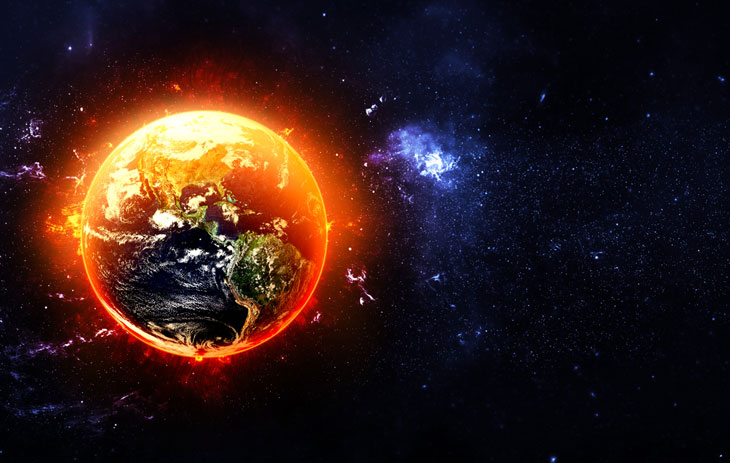 Parler
Parler Gab
Gab
- NSW farmers reject climate alarmism despite record floods, citing centuries of natural variability.
- Stalled high-pressure system blamed for extreme rains — part of weather cycles, not CO2 trends.
- Dairy farmer Craig Emerton highlights historical evidence of past flooding predating industrialization.
- Greens’ antinuclear stance undermines credibility among skeptics pushing for pragmatic energy solutions.
- Scientists insist climate change is linked to rainfall, but farmers argue cycles predate human influence.
The science and the silence: Natural storm systems amidst the climate debate
University of Melbourne atmospheric scientist David Karoly identified a “blocking high” over the Tasman Sea as the immediate cause of the stalled weather front, where southeasterly winds dragged moisture ashore for days. Yet skeptics counter his claim of an anthropogenic “new world” of uncontrolled storms by pointing to similar weather mechanisms documented for centuries. Tom Saunders of the ABC noted the jet stream split — a phenomenon he said occurs regularly — created a weather traffic jam. “The high-pressure system isn’t novel,” Emerton retorted. “What’s new is the scaremongering around it.” Emerton estimates May’s rainfall reached triple previous highs on his farm, but he attributes this to predictable hydrological cycles, not catastrophic human interference.Why Greens opposing nuclear power fuel skepticism among conservatives
Eric Worrall, a British climate commentator, argues the absence of nuclear energy in Australia’s climate policy toolkit — despite France’s 60% nuclear success — exposes contradictions in mainstream environmentalism. “If climate change were truly existential, greens would embrace any clean energy, but they’re ideologically fixated on renewables,” Worrall wrote in a recent essay. “Their dogma justifies doubting other claims.” Australian Greens have ruled out nuclear power despite public polls showing 70% support among voters. Climate Council-affiliated figures like Karoly reinforce skepticism by pairing anticarbon rhetoric with oppose nuclear — a stance Worrall calls “irrational.” “If nuclear is too dangerous or costly, why does France’s model work? This shows the climate debate is political, not scientific,” he said.Historical context: Why farmers’ stories matter today
Australia’s history is etched in extremes: The 1896 floods that swamped Bourke, the 1955 Hunter Valley deluge, and even biblical accounts like antediluvian rains long predate industrial-age CO2. Farmers argue that climate science’s narrow focus on anthropogenic causes ignores millennia of naturally chaotic cycles. “These storms are part of our heritage, not a harbinger of doom,” said McGinn. “My family has survived lean times and lush times — we adapt, but we won’t be bullied by climate bullies.” Her skepticism echoes broader skepticism among agricultural communities who feel climate policies are driven by ideology rather than data.The science isn’t settled (but the show must go on)
As Australia braces for another rainy week, the divide between climate activists and rural realists sharpens. Farmers like Emerton and McGinn embody a growing movement challenging alarmist narratives — with help from meteorologists and critics who question policy choices like renewables-only energy plans. Karoly and his peers insist “climate change amplifies extremes,” but skeptics demand proof beyond correlation — and policy solutions that aren’t built on “green fundamentalism.” In a land where drought cycles have always tested survival, these farmers argue, human-caused doom is unnecessary. “We’ll keep fighting the floods,” Emerton said. “Just don’t tell us it’s our fault.” Sources for this article include: WattUpWithThat.com ABC.net.auOcean currents carry centuries-old mercury pollution to Arctic, poisoning wildlife
By Cassie B. // Share
Unmasking the “Hockey Stick”: A controversial journey through climate science’s most heated debate
By Belle Carter // Share
U.S. EPA signals return to fossil fuel dominance with power plant emission rollbacks
By Willow Tohi // Share
STOP CSAM Act sparks backlash over threats to privacy and free speech
By Laura Harris // Share
Physics debunks climate alarmism: CO2 cannot overheat the planet – IT FEEDS THE WORLD
By Lance D Johnson // Share
Governments continue to obscure COVID-19 vaccine data amid rising concerns over excess deaths
By patricklewis // Share
Tech giant Microsoft backs EXTINCTION with its support of carbon capture programs
By ramontomeydw // Share
Germany to resume arms exports to Israel despite repeated ceasefire violations
By isabelle // Share










